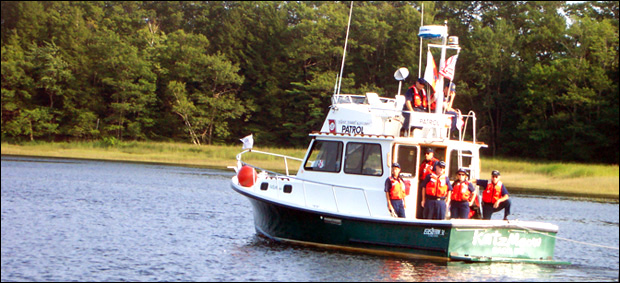Since its creation by Congress in 1939, the U.S. Coast Guard Auxiliary (the Auxiliary) has served
as the civilian, non-military component of the Coast Guard.
Today, the 30,000 volunteer men and women of the Auxiliary are
active on the waterways and classrooms in over 2,000 cities and
towns across the nation.
Each year, Auxiliarists save almost
500 lives, assist some 15,000 boaters in distress, conduct more
than 150,000 courtesy safety examinations of recreational vessels,
and teach over 500,000 students in boating and water safety courses.
The results of these efforts saves taxpayers hundreds of millions of
dollars every year.
|
Why Join The Auxiliary?
• Be Part of the Action & Help Save Lives
Since the recreational boating population in the United States is growing rapidly, the Coast Guard Auxiliary needs a few good
men and women like you. As an Auxiliarist, you will have the opportunity to select and participate in one or more of the Auxiliary's
major programs. If you feel strongly about the rewards you can get from serving your community, the Coast Guard Auxiliary is the
right place for you! Either through on- water Operations, the Auxiliary's Public Education Program, Courtesy Examination Program,
Radio Watchstander, Coast Guard Recruiting, Marine Environmental Protection or Coast Guard Administration.
• Increase Your Skills
The Auxiliary and the Coast Guard provide specialized training on all aspects of boating, as well as leadership and
administration. Auxiliarists receive valuable training in seamanship and related skills, and enjoy the sense of confidence
of knowing that they are better and safer boaters.

• Support the Coast Guard
Auxiliarists provide direct operational and administrative support to many local Coast Guard units. You can wear the Coast
Guard Auxiliary uniform and become part of Team Coast Guard. When you qualify through training, you can take part in Search and
Rescue operations, stand radio watch at the Coast Guard Station, work with the Marine Safety Office on pollution matters or work
in the Recruiting Office.
• Service to Your Community
Auxiliarists are not paid with money, but with satisfaction. We furnish and maintain our own equipment and can choose to
participate at a level tailored to our individual capabilities. We provide boating safety classes for youth and adults and examine
recreational vessel for safety equipment to ensure that our neighbors will be safe on the waterways.
• Enjoy Fun & Fellowship
In all activities, enjoy fellowship - the good company of other Auxiliarists at meetings and training sessions, on patrols
and other missions, and at ceremonies and social events. One of he Auxiliary's trademarks is good old-fashioned hospitality. Friends,
neighbors and interested members of the public are always welcome to attend one of our flotilla meetings. In addition, dedication to
boating safety provides the atmosphere for getting together to swap boating experiences and participate in cruises and rendezvous.
You'll find a special camaraderie among Auxiliarists that's hard to beat. There's time to relax and have fun at Auxiliary outings,
training sessions, patrols, CMEs, classes, and conferences. Auxiliarists make lasting, meaningful friendships. Knowing that you belong
to a special group of people and directly participate in helping save lives gives your Auxiliary membership a special meaning.
|

